As a busy team of one, you need your marketing efforts to result in more sales, which is why using visual content in social media is a simple method to attract, engage, and acquire leads and customers.
Sure, everyone is talking about how important visual content is in your strategy. But, you probably didn’t realize that including images in your posts makes your content—and your business—more:
1) Attractive,
2) Engaging,
3) Understandable,
4) Memorable, and,
5) Relatable.
You need these five factors to help stand out in an overcrowded market with much competition!
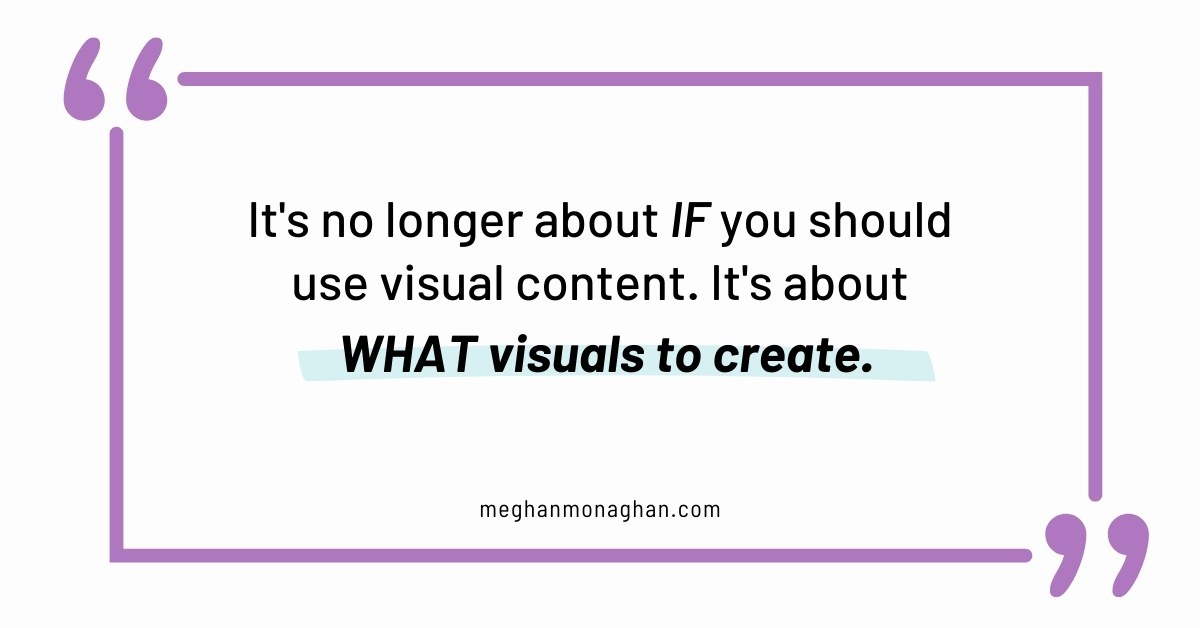
Visuals are a budget-friendly, simple but powerful way to help you differentiate your brand while communicating your message clearly and quickly. And by visuals, I’m talking about graphics, videos, photos, graphs, infographics, charts, memes, gifs…just about any content that isn’t text-based.
In this article, you’ll discover how and why images help you attract, engage, and acquire customers. Let’s get to the good stuff!
Visuals in your social media posts make an impact on your marketing. Here's how.Click To TweetWhy Using Visual Content in Social Media Improves Your Marketing
1) Visual Content Attracts Followers
You’re competing against others for space and visibility across social media platforms as well as in search engines. Textual posts simply don’t get noticed because they lack the wow factor that separates your content from everyone else’s.
Content with relevant images gets 94% more views than content without relevant images.
Visuals make a big difference in an overcrowded social media feed and help attract new followers. Plus, visuals keep the attention of your existing fans. Look to visual content as a quick way to:
- express your brand;
- convey an emotion;
- highlight important data;
- illustrate intangible concepts;
- differentiate your business;
- showcase your product and offers; and,
- increase traffic to your site.
Case in point, which of these two posts grabs your attention and makes you more likely to pause to read?
The tweet without an image?

Or the tweet with an image that uses humor to tie into the headline and get users to click on the link?
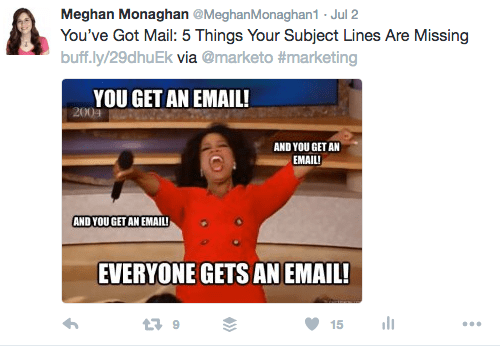
2) Visual Content Engages Followers
Simply put, your content with images has more chance of being read, liked/favorited, commented on, and shared than your text-only content.
Look at these statistics:
- Posts with images produce 650% higher engagement than text-only posts. (Webdam)
- Visual content is 40 times more likely to get shared on social media than other types of content. (Buffer)
- Facebook posts with images see 2.3X more engagement than those without images. (Buzzsumo)
- Visuals in color increase people’s willingness to read a piece of content by 80%. (Xerox)
- Tweets with video get 10 times more engagement than those without. (Hubspot)
You might as well take advantage of images to create more engaging content. And believe me, you need all of the help you can get with engagement!
After all, social media is more competitive than ever. The platforms use engagement as a factor to determine how to prioritize your content in the feed and how often to show it. It turns out that popularity does matter (just like in high school)!
The more people engage with your social media posts, the more likely platforms are likely to show it to users.
Here’s a real-life example. This Facebook image post from Post Planner’s business page received over 64 million views, 150,000 likes, 2,300 comments and 787,000 shares—ORGANICALLY. (Let that sink in for a minute…)
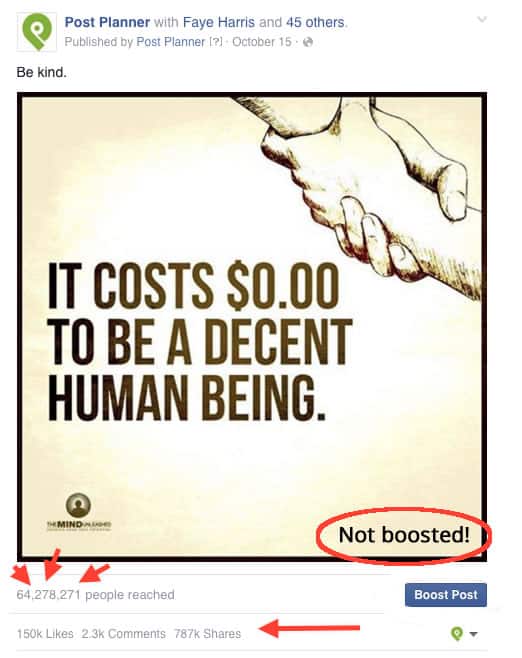
PostPlanner used only two textual words, but the image’s impact helped make the post go viral. And it’s not even their image!
For a business built on helping customers find shareable and engaging content, Post Planner did a great job of showing how effective their product is!
Can you see the benefits of using visuals to boost your engagement, brand awareness, and potentially your profit?
3) Visual Content Is Easily Understood
When it comes to comprehension, our minds prefer visuals because they communicate more information, more effectively.
90% of the information sent to the brain is visual, and images are processed 600,000 times faster than text.
According to an infographic by Column Five Media, humans are biologically wired to process the world visually. Human brains process visual cues in 1/4 second!
With your brain pre-wired to interpret relationships between objects, visuals allow for almost instant comprehension with minimal effort. Also, your brain interprets visuals faster than it can process language.
Take a look at a snippet of the infographic “Why Our Brains Love Visual Content” from Column Five. You’ll likely find how quickly your mind interprets relationships visually.
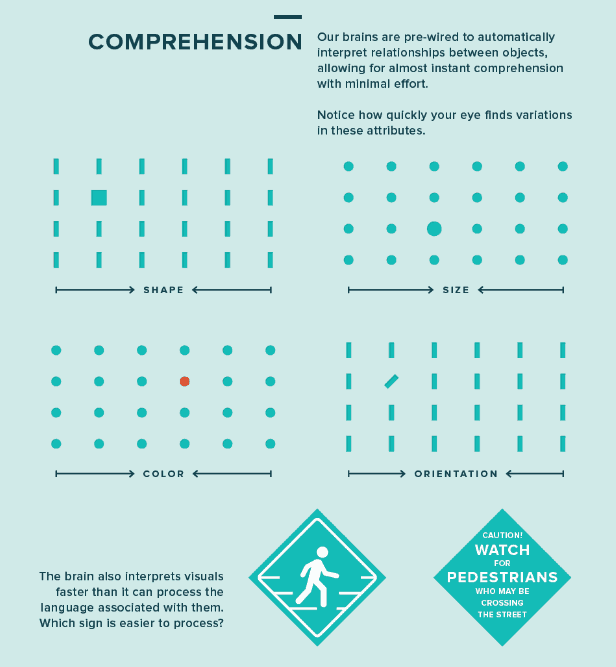
With the average consumer’s attention span at eight seconds or less, visuals help your customers understand your message quickly.
4) Visual Content is Memorable
Visual content is memorable for similar reasons why it’s easily understandable. Thank you, science!
As we just discussed, your brain quickly makes connections to already-stored information in your memories, which helps with retention. If you add emotional and aesthetic appeal into the design, your brain further deepens the encoding and retention of information.
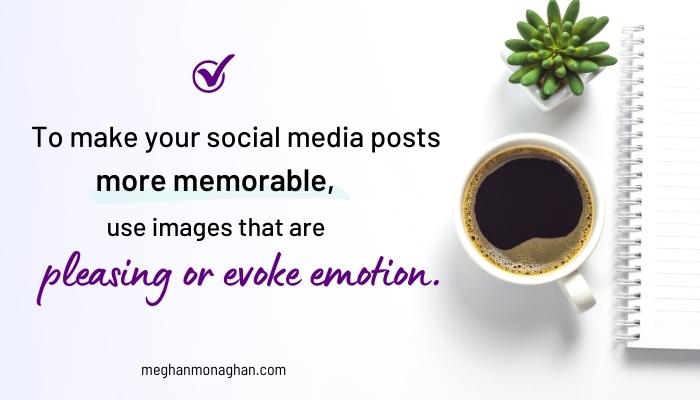
Said another way, including images that are pleasing or evoke emotion will make your social media posts more memorable for your audience. Then, when it’s time to make a purchase or donation, your audience will remember your business.
People remember 80% of what they see but only 20% of what they read and only 10% of what they hear. So use your images strategically. You’ll help your audience remember you and your message when they need you in the future.
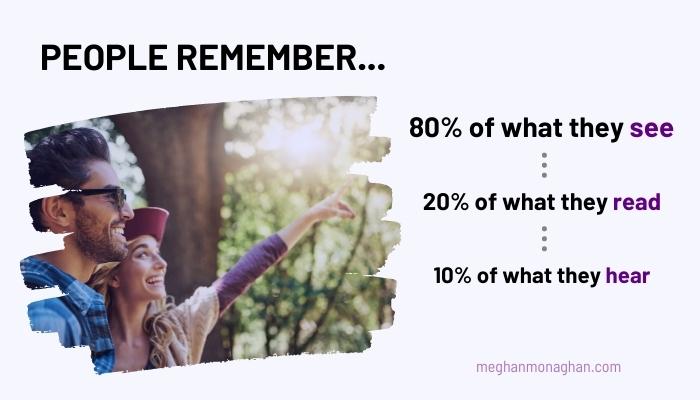
5) Visual Content is Relatable
My favorite part of visual content is that it can make your social media posts highly relatable. People buy from those they know, like, and trust—which is where that “relatable” factor really makes a difference.
According to Wyzowl’s research, 84% of people say that they’ve been convinced to buy a product or service by watching a brand’s video.
When people relate to your content on an emotional level, they form a bond or relationship with your brand that is perceived as “likeability.” Let’s face it, followers are attracted to those they like! Humor, data, quotes, and even personal photos in your posts can really help people to get to know you and build relationships online.
Don’t underestimate the value of being a business or person to whom others can relate. According to Psychology Today, emotion has an influential role in consumers’ purchase decisions:
- fMRI neuro-imagery shows that consumers primarily use emotions rather than information when evaluating brands.
- Research reveals that the emotional response to an ad has a greater influence on a consumer’s intent to buy a product than does the ad’s content.
- The Advertising Research Foundation’s research concluded that the emotion of “likeability” is the most predictive measure of whether an advertisement will increase a brand’s sales.
- Studies show that positive emotions toward a brand have more influence on consumer loyalty than trust and other judgments which are based on a brand’s attributes.
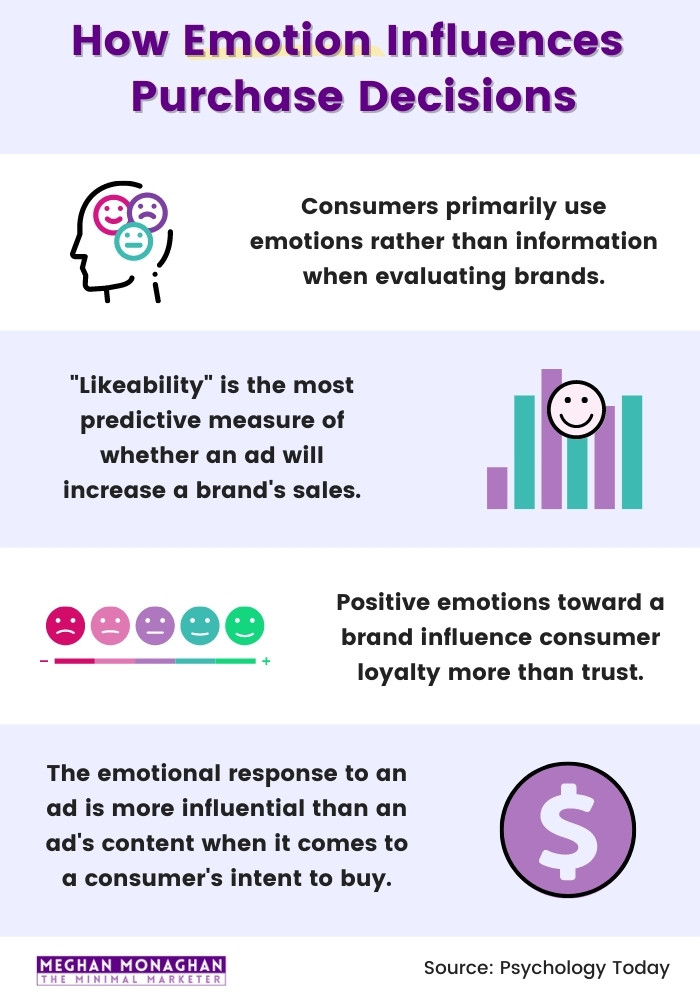
If you take what you’ve learned so far, it’s not a stretch to see the correlation between relatable visual social media content and purchase decisions.
6) Visual Content is Super Shareable
The reality is that you need more visibility and reach to get in front of more people. Unfortunately, since platforms are swamped with tons of content, it’s getting harder to get seen. So, motivate people to share your content by including share-worthy images.
Moving, powerful, thought-provoking, hilarious, fun, and clever images encourage people to share your content with their own networks. Who can resist reposting a visual that caused a reaction of surprise, laughter, tears, or admiration?
Check out Visualize Value’s Twitter account for inspiration. The creator, Jack Butcher, transforms quotes into images that convey the sentiment much more powerfully than the words alone. Brilliant—and very shareable.
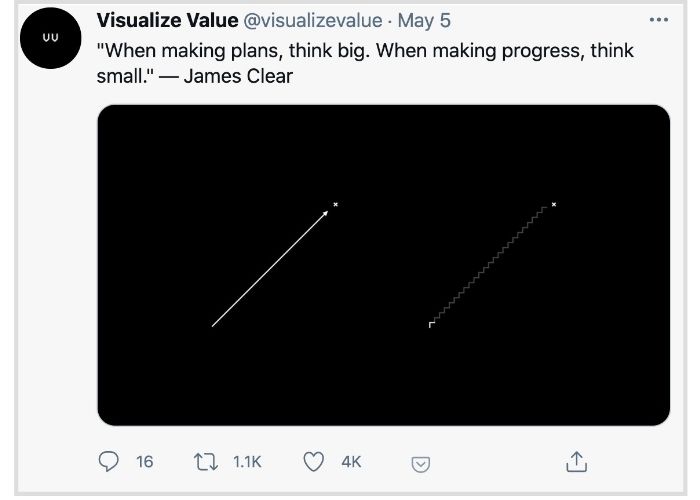
You know that I especially love this example since I’m a big proponent of using quotes with accompanying images in social media.
That said, it’s unnecessary (and not very effective) to create content for the sake of “going viral.” Thankfully, the viral nature of social media content isn’t required for you to benefit. Even a few people sharing your content can boost your visibility and reach.
Definitely consider the impact your images could have on your visibility. And, the next time you create a visual, incorporate some of the characteristics that make it super shareable.
7) The Benefits of Visuals Extend Beyond Social Media
When you think about social media trends and the popularity of more visual platforms like Instagram and YouTube, it makes sense to incorporate more visuals into your marketing. Not only because of the reasons listed above but also because you’re creating assets that boost the effectiveness of your other content.
According to Venngage, 62% of marketers create visuals for blog and website content followed by Facebook (49%) and Instagram (47%).
The benefits of visuals extend beyond social media. You can most certainly repurpose social media visuals for blog posts, emails, podcasts, and more.
P.S. You can also repurpose blog visuals into social media content! Larry Kim has one of the best Twitter feeds (follow him if you don’t already) and is an account to look at for visual inspiration. Check out how he turned a large infographic into a tweet:
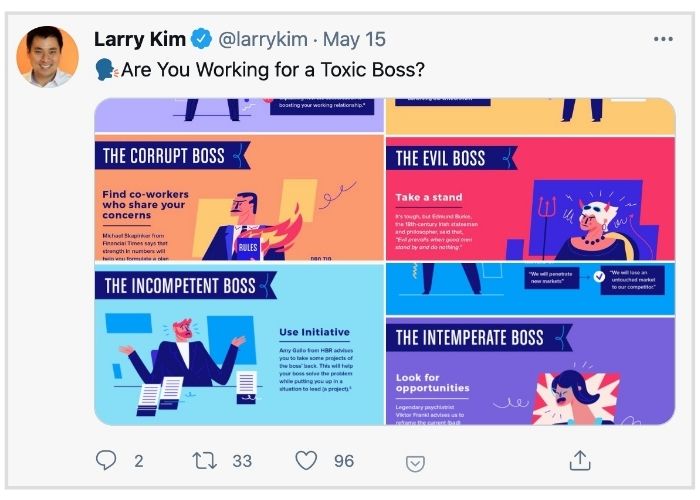
You’ll get far more mileage out of your hard work by re-using your visual content across multiple platforms. And that is a seventh reason to use more visuals!
In addition to the added productivity of repurposing content, visual content also boosts your visibility, authority, and readability of your website and blog. Visuals break up text, convey meaning, support skimming, and make your content more appealing.
Plus, people love video. It’s one of the best forms of content marketing for conversion. But video isn’t popular with humans only. According to Wistia, search engines like Google often rank posts with video higher than those without.
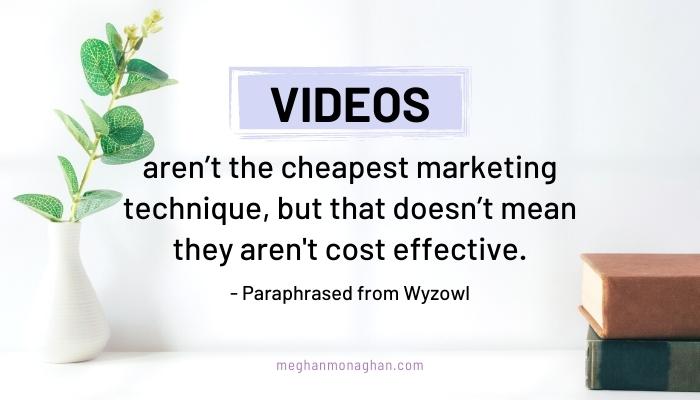
The point is, your social media visuals 1) are usable beyond social platforms and 2) increase the effectiveness of your other content assets. #WINNING
Social Media Visuals are Becoming the Norm
At this point, you’ve got to have some visual component to your content to compete. In the past, not everyone used visuals. But nowadays it’s the norm. So, it’s no longer about IF you should use visual content. It’s about WHAT visual content to create.
Unfortunately, Venngage’s survey of marketers found they struggled with producing visuals consistently. Other struggles included great design and sourcing the content.
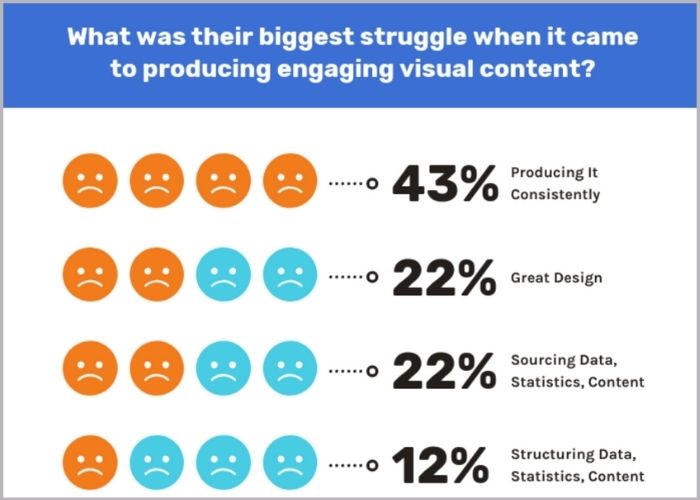
With that in mind, you may need suggestions for how to fast track visual content creation. Here’s how I manage:
- Templates
- Swipe files for inspiration (thank you Pinterest!)
- Swipe files for content research
- Competitor analysis
- Screenshots
- Animated GIFs
- Emojis
Swipe files and templates make the research and design easier and faster. Looking at your competitors provides inspiration to make ideation faster.
And when you don’t have time for graphic creation? Sprinkle in screenshots, animated GIFs, or emojis, which all provide a visual component to your posts.
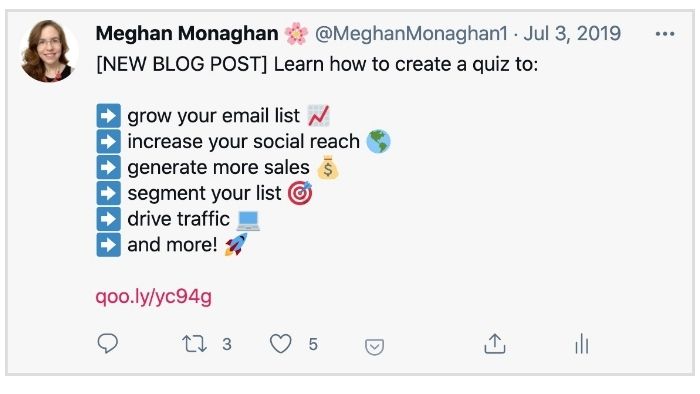
Don’t be afraid to get creative. Take a few risks, try something new. Not every visual needs to be a work of art. But each one should be relevant to the content and to your audience.
The important takeaway here is to understand the role visuals play in your marketing – across social media and everywhere else!
If your marketing hasn’t been as effective as you’d hoped, try incorporating more high-quality, relevant visuals into your content to see if it helps.
UPDATED JULY 6, 2021 | PUBLISHED AUGUST 3, 2016

Great info as usual Meghan. I use images in most of my posts and tweets, but I do like to mix it up once in a while with some plain text too.
Hey Bob, good to see you here! I’m with you…I like to throw in some text tweets here and there. (Look how well Mike Kawula’s text-only tweets perform! –> @MikeKawula) On other platforms, however, I always include an image because I’ve found text-only Facebook and LinkedIn posts don’t perform as well. As for Instagram, we know it’s required to use a visual! As your audience’s attention span decreases and competition for visibility increases, it’s tougher to get noticed. And that’s where visual content can really come in for the assist! Appreciate the comment and feedback, thanks a bunch. 😉
Great post, Meghan. Lots of information conveyed in an attractive visual layout. I will be definitely be making better use of images. I always include a relatable image in my posts and have been considering adding copy.
Hello Joyce! It’s great to hear that you always include a relatable image in your posts. That’s what you need to be doing. Adding text is sometimes beneficial, especially if you have more to add to your message but want to keep your post’s text brief. Thanks!
These are really great points! Visual content is a must have these days. I do find it quite time consuming to create – even with all of the wonderful tools available these days.
Thanks Stacey. “Time-consuming image creation” is a complaint that I hear frequently. Sometimes I’m fast at image creation; other days, not so much! I’ve found that it all depends on my prep work and the tool I’m using.
Yes, yes, yes and so many levels. I tend to scan more than I read and images really help me digest information quickly. If I click on a link that looks more like a research paper without any supporting images I’m much more likely to click away. Even social media posts just get it done better with images. Great reminder!
Thank you Meghan for continuously giving good materials. I am very very impressed
Thanks for the kind words Max! I’m happy you found value here.
Meghan, you covered some great points on visual content. I find on social media that posts are much more well received with excellent graphics. It is so important to get the VISUAL right the first time!
Agree, visual content is a must nowadays. And I agree also that it creates an emotional link to the people reading your content.
This is a great reminder to keep up with the trend. Thank God that easy-to-use visual applications are available for those who have no background in design.
I definitely notice the difference in engagement when I use visual content. Slowly getting better at it.
100% agree with all of your reasons why using visual content is a must, Meghan 🙂 Engagement is my favorite reason!! Awesome post with so many valuable tips, thanks for sharing!!
I am a really visual person so the imagery in my blog posts is important to me – that sometimes takes me longer than writing the post!
Got some good tips here. Agree that people relate to visual easier. And the relate faster as well. Loved the infographic too
Oh yes Kristi! I agree with your point and as a virtual person, it relates well to me. Virtuals get my attention the most and of recent videos in particular. I tend to share 90% of the content I interact with when they have great visuals.
I’m definitely a visual person. Using visuals make it so much more interesting, and frankly, it’s a lot more fun when you have something to look at as well.
Great article! I signed up for your freebie too:) I use visuals but need to use more for sure.
Woo hoo! That’s great Tandy, happy to hear it. The rest of the month’s blog topics will focus more on how to create visuals quickly and easily, so check back if you feel like it. Thanks for stopping by. 🙂
Goodness, I can relate. I still believe a picture is worth more than words. Now there are graphics and numbers to prove same.
Appreciate the information and the download.
:=)
Happy to hear you found value in the article and downloaded the free list! Thanks Celea.
Great comprehensive explanation of the need for visuals, Meghan. As a photographer, I have always been inclined toward visual postings–and I know well the power of pictures.
Yes on all accounts, humans are visual creatures and respond to visual. I’ve loved helping clients with more visual content.
Hi Meghan,
I love social media because of the visual content. It takes marketing and relationship building to a new level and makes it fun!!
Fantastic article! Agree 1000%! Love all your tips, especially one about blog. Been working on that, but will strive even more.
Great post – I have always chosen a post to read or an ad to look at by the image and the more attractive it is the more likely I am to read it.
You have packed loads of extremely useful info in this. Nice work!
Hi Melanie, thanks for the compliments, appreciate it. Images attract my attention too. 🙂
Wow, those are some great stats on using visuals. It’s funny how even though I love to read, my brain goes right to graphics. Although, I don’t care for video, so if I see that, I just skip the post.
People are definitely attracted to visuals! I like videos but prefer to read them with subtitles, which makes no sense at all – haha! In my experience, videos are much more helpful than text when it comes to tutorials and instructions. But sometimes I don’t feel like listening and would rather read. Thanks Carol!
Excellent! I love all this. Great infographic, too. Will be sharing this widely. BTW, I’m a big believer of visual content. I have nearly 6,000 images that I use and share often with my social media followers on 3 platforms.
I’m so happy you enjoyed the post, Jackie! You know I appreciate your shares too, thank you. 🙂 If you’re using 6k images, you definitely “get it” when it comes to visual marketing, no question there!
Meghan – well, this was reassurance that my suspicions were right. I’ve always been a visual person, and for fun, I actually will page through old Look and Life magazines. I think that for some reason not only are most internet users visual, they’re actually anti-audio. I read somewhere that even when internet users watch most posted videos, they turn off the sound.
I think most people prefer visuals–even if they don’t realize it. 🙂 I’m one of those anti-audio people, haha! I prefer my videos subtitled, and I have no idea why. Often I’m watching video from my smartphone and don’t have headphones, so maybe I’ve grown accustomed to captions. Thanks Joan!
We can definitely help our blog stand out and catch interest by adding photographs and clip art to our posts. An image is worth a thousand words, right? Images are a powerful way to express a point and grab attention.
Visuals absolutely are the bread and butter of our business. And I don’t just mean images of our jewelry. We love pairing jewelry with fashion, or a gemstone used in a necklace. From the time we started blogging we used many images in our blog. We have several templates now & Pinterest is a great resource. We also love creating memes.
So I agree 100% with your points.
You’re in a great niche to use visuals. I love your use of vibrant color and pairings. You’ve got visual content mastered! Thanks Roz 🙂
I did not realize I need more than one image in a blog post…so ok, I will definitely keep that in mind. I also have been trying to understand how Post Planner works too. Your example of their results is quite astounding. Thanks for the great info!
I’m more tempted to stop and read something with an interesting picture attached so I really understand your points. I always try to enhance my point with interesting images.
As a visual person, I really get the ‘whys’ you shared in your post, Meghan. I have been including more and more visuals in my blog posts and only do social media posts that have ‘memorable’ (hopefully), graphics. I’m always curious why when I write for the Huffington Post, they do not welcome multiple graphics or images in posts. If you look at most of the posts there, they don’t even have images or even sub-headings. Sometimes the HuffPost does add a slideshow to the bottom of the post that relates to the content. With the online world becoming more and more visual, it seems we all can’t go wrong adding more visuals to our presence. The line that got me was “With the average consumer’s attention span at eight seconds, visuals make a big difference in helping your customers understand your message.” Yikes! What are we doing to our brain’s ability to process information and our comprehension? Here’s to reading and developing skills other than merely visual ones.
Hello Beverley! I admit: I was a bit surprised by the science behind visuals and our brains. Like you, I’ve wondered the same thing about HuffPo and other online magazines. Maybe they have so many ads that they’re concerned more images will weight down their site’s performance? Or maybe they don’t have a method to easily approve images (text is easier to put through an automatic filter). We may never know, but I wish they would use more visuals. Thanks for your thoughtful response. 😉
You’ve been reading my mail, Meghan. I was having this very conversation with my seo person this morning, about images in my blog. Hadn’t dawned on my wee brain that I needed more than one! So, I’m changing that. Love all the info as to why this helps!
Terrific Susan! I guess you didn’t need any convincing of why images are awesome. 😉 Blogs definitely benefit from more visuals because they give the eye a rest from all of the text, keep readers engaged (and reading), and convey emotions/ideas so easily. Thrilled that you’re already on your way to using more images, good for you!
These are great tips. As someone who is in the same field, I seem to get some resistance to the idea of using MORE visual content than text! With your well-thought-out explanations I think people will have a harder time resisting!
Thanks Kristi! Visual content really enhances so many aspects of marketing–from blog and social media posts to sales and promotions. I definitely tried to convince people of this with statistics so that they’d understand and value images more. 🙂
Great article! I signed up to get the free download as well. Good examples of how we should incorporate visuals in our communication. Thanks!
That’s awesome, thanks Audrey!